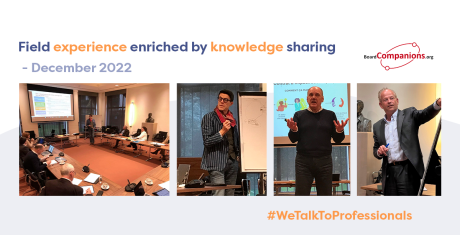Chief Audit Executives may have difficulties making themselves understood by the board members. Are they biased? Are they preoccupied with ideas that are obstacles to effective communication?
These are the subjects we discussed on Monday, October 4, 2021 during a webinar with a dozen Chief Audit Executives from the Institute of Internal Auditors (Greece).
We looked at the mindset of the chief audit executive. What is on his/her mind?
- Shall I talk about the findings? or about the audit process? I should probably talk about the key audit findings, but I did not fish anything great. My findings are neither fantastic nor representative of our work and efforts during the quarter.
- I am always late compared to the others. I have difficulties maintaining the attention of the board members on issues that are 6 months old. They want me to talk about current or prospective issues … but most of our work is confined to topics of the past.
- I am obsessed by my role of trusted advisor. I mobilize my troops by promoting the role of “trusted advisor” and all of us are convinced there is much value in adopting this attitude. We spend much energy showing management we are working by his side.
- Am I comfortable with my attitude of “management bypass”? The audit function is clearly a “bypass” of management. I personally know the top managers much better than the directors and I feel dishonest to managers when I whistle blow sensitive information behind their back. I feel honored and proud to talk to board members, but I do not want to expose managers to suspicious questions raised by board members.
Understanding the concerns and mindset of the internal auditor allows us to be clearer about our expectations of them. The result is a more effective dialogue.




